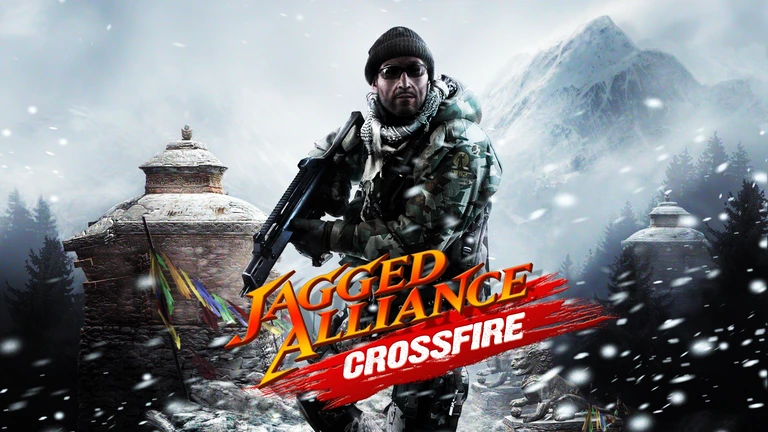Jagged Alliance: Crossfire is a Turn-Based, Tactical, Action, Role-Playing, and Strategy game published by bitcomposer Entertainment, Kalypso Media, THQ Nordic released in 2012.

Jagged Alliance: Crossfire has the following styles of play.
- In most turn based games each player has a turn to play while the other can simply manage their options for when their turn comes around.
- Tactical games are a subgenre of strategy games that focus more on operational warfare, military style tactics, and troop placement. They focus more on logistics and production than on combat, and can at times feature complex battlefield tactics.
- Action games are fast paced and tend to put the player in the middle of the action, requiring you to jump over obstacles, climb ladders, and shoot things.
- In a role playing game, or RPG, the player takes on the role of the main character and helps the story line to unfold. It usually involves a very long play time, inventory management, and a deep leveling system. RPG's are usually the longest style of game. Skyrim and Fallout are amongst the most popular RPG style games.
- Strategy games tend to focus on planning and skillful thinking in order to beat either real players or bots. They can be either real-time in which the play clock ticks continuously or turn-based where each player has a dedicated turn to finish their action. It is not uncommon to include exploration and resource management.
Port Forward Jagged Alliance: Crossfire
When you are playing Jagged Alliance: Crossfire you might need to forward some ports in your router. Forwarding ports is a useful trick in gaming because it can really help to make your network connection most stable and sometimes even faster. Routers were not designed to allow incoming network requests and some games can play tremendously better if an incoming connection is forwarded through the router to the game.
Use a VPN Instead
Have you considered using a VPN instead of forwarding a port? For most users, a VPN is a much simpler and more secure choice than forwarding a port.
We use and recommend NordVPN because not only is it the fastest VPN, it includes a new feature called Meshnet that makes forwarding a port no longer necessary for most applications. With NordVPN Meshnet, you can connect to your devices from anywhere in the world, completely secure, over a highly encrypted VPN tunnel.
When shopping for a VPN, make sure that they meet the following criteria:
- Your VPN provider should have a no-logs policy. This means that they do not keep any logs of any kind.
- Make sure that your VPN provider has lots of exit nodes all around the world.
- Check that your VPN will not affect your speed.
- Verify that your VPN provider uses WireGuard as the underlying protocol.
- Many people prefer a VPN provider that is not based in the United States.
This is the list of requirements that we used when we were shopping around for a VPN provider. There are lots of free, shady VPN providers out there that we looked at and dismissed.
Based in Panama, using diskless servers, and with over 6,100 servers in 61 countries, we can safely say that NordVPN satisfies all of these requirements.

Once you've set up your NordVPN account on multiple computers and enabled Meshnet, you can seamlessly access all of your devices as if they were on the same network. You don't even have to log in to your router. It's very simple.
Every time you click on one of our affiliate links, such as NordVPN, we get a little kickback for introducing you to the service. Think of us as your VPN wingman.
Before You Forward a Port
Before you can forward a port you need to know the following things:
- Your router's IP address.
- The IP address of the device that the game will play on: either your computer or your console.
- A list of TCP and UDP ports that need to be forwarded.
How to find your router's IP Address
The easiest way to locate your router's IP address is to run our free Router Detector utility. It's a part of the Network Utilities suite of tools and it's completely free to use.
How To Forward Ports
The easiest way to do this is to use Network Utilities. Network Utilities can forward your ports in just a few clicks, and close them back down when you are done just as easily. You can also do it the manual way.
The general process for forwarding a port is:
- Open a web browser and navigate to your router's IP address.
- Locate your routers port forwarding section.
- Put the IP address of your computer or gaming console in the proper box in your router.
- Put the TCP and UDP ports for your game in the matching boxes in your router.
- Frequently you have to reboot your router for the changes to take effect.
Don't forget to sign up for NordVPN's promo deal before it's gone.

You might notice that most of our site doesn't have ads on it. This is because we use partnerships with companies like NordVPN to keep the site running. Thank you for supporting us by using our referral links.
Ports Required for Jagged Alliance: Crossfire
The exact ports for Jagged Alliance: Crossfire are as follows:
Jagged Alliance: Crossfire - Steam
- TCP: 27015, 27036
- UDP: 27015, 27031-27036
Jagged Alliance: Crossfire - PC
- We do not know the PC ports for Jagged Alliance: Crossfire yet. If you know them please send us a message using our Message System.
If you want to follow guides that are custom tailored to your exact router and Jagged Alliance: Crossfire simply follow one of these links:
After following those steps your ports should be forwarded. Head to our applications and games list for more port forwarding guides.








